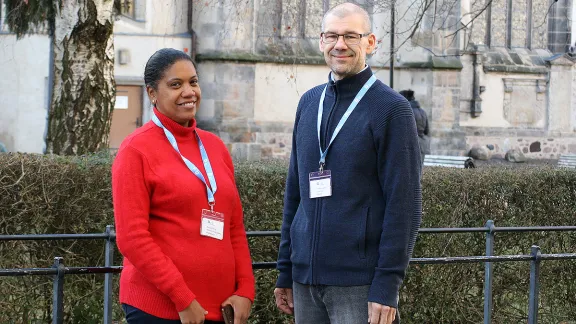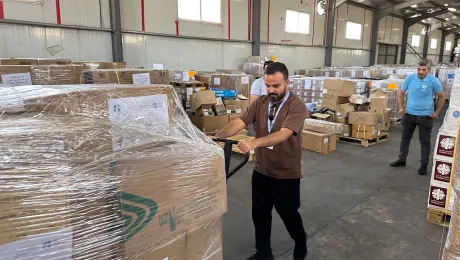
Holiharifetra Rakotondramiadana (left) is a âwoman theologianâ of the Malagasy Lutheran Church and Tommi Vuorinen is a pastor of the Evangelical Lutheran Church of Finland serving in Australia. Both participated in the 17th International Theological Seminar in Wittenberg, Germany. Photo: LWF/A. Weyermüller
Interview with participants of the Theological Seminary in Wittenberg
(LWI) – Two weeks with other Lutheran theologians from around the world, studying biblical texts, as well as the writings of Luther and discovering their relevance for theology in the 21st century.
A rare opportunity but one that was recently afforded to theologians who took part in the International Theological Seminar, held in Wittenberg, Germany.
Lutheran World Information spoke to two participants of the 17th International Theological Seminar, which took place from 3 to 17 March. Holiharifetra Rakotondramiadana is a theologian of the Malagasy Lutheran Church and Tommi Vuorinen is a pastor of the Evangelical Lutheran Church of Finland who serves in Australia.
Please tell us about the places you live and work in.
Holiharifetra Rakotondramiadana: I studied theology in Madagascar and Norway for 10 years. My church does not ordain women, although women have been able to study theology since 1974. Therefore, I am not called “reverend” but “woman theologian”. I work as coordinator of international overseas mission in the head offices of my church in Antananarivo. With the help of our partners we send missionaries from Madagascar to Papua New Guinea, Bangladesh and other countries.
The Malagasy Lutheran Church is a growing church. With four million members it is the third-largest Lutheran church in Africa. Much of this growth can be attributed to a strong grassroots revival ministry. People of all ages make a lot of effort to meet in four retreats - big Christian camps, so-called “Tobilehibe".
Casting out demons is a common practice when converting to Christianity as many people adhere to traditional religions, which include ancestor worship and other magical practices.
The Malagasy Lutheran Church is a growing church. With four million members it is the third-largest Lutheran church in Africa. Much of this growth can be attributed to a strong grassroots revival ministry.
Tommi Vuorinen: After studying theology in Finland, I went to Sweden for three years. For the past 10 years I have been serving in a Finnish-speaking congregation, which is part of the Lutheran Church of Australia. It has grown out of a community of Finnish migrants who came to Australia mainly from 1950s to 1970s.
By now its members are aging while their children have either integrated into Australian society or have gone back to Europe. This means that the congregation is shrinking. Nevertheless, it is important for these people to have a pastor who can speak their mother tongue, particularly when they are no longer very mobile or actively participating in society through work or other social engagement.
What motivated you to participate in the International Theological Seminary in Wittenberg?
Tommi Vuorinen: With my background I found the theme very interesting: “Reading the Bible with Luther in our respective contexts”. Also, I have always wanted to visit Wittenberg and the Luther sites. In the seminar, these visits e.g. to the Luther House or to Erfurt or the Wartburg make up a considerable part of the program. And I was keen to meet other Lutheran theologians at an international level.
Holiharifetra Rakotondramiadana: I also find the historical places where Luther lived and worked very interesting. But I was also looking forward to spending time studying once again – two weeks really take one out of day-to-day business. Finding interpretations of the Bible for today is very rewarding, particularly when I can exchange ideas with others.
What does it mean to be a Lutheran Christian in your context? What are the challenges you face in your church?
Holiharifetra Rakotondramiadana: At congregational level, being Lutheran means adhering to traditions. For example, efforts to add new songs to our hymn books have not been accepted. Some church members would regard that as questioning their Lutheran identity.
This conservative approach has affected women’s ministry since many Christian members, either women or men, still think that “the office of the church” is only for men, even though the priesthood of all believers has been preached and taught for 150 years. For me, it is shocking to see women who do not vote for their fellow women to be committee members. As a result, women’s ordination has not yet been accepted in the church.
This attitude has not been influenced at all by the revival movement in my church. However, being a Lutheran Christian also means keeping and preaching the pure Lutheran doctrine and living according to the Scripture.
Tommi Vuorinen: In Australia, being Lutheran also stands for a certain degree of conservatism and a strong sense of being a confessional church.
By now the members (of the Finnish congregation) are aging while their children have either integrated into Australian society or have gone back to Europe. This means that the congregation is shrinking. Nevertheless, it is important for these people to have a pastor who can speak their mother tongue, particularly when they are no longer very mobile or actively participating in society through work or other social engagement.
I am a member of the Commission on Theology and Inter-Church Relations. At the moment, we are preparing a paper for our synod scheduled for October where we will discuss the ordination of both men and women. This is not an easy task in the Australian context.
Also, the Lutheran Church of Australia only has an affiliate membership to the Lutheran World Federation now. Changing this is another challenge ahead of us.
What has been a theologically inspiring moment or encounter for you during your time in Wittenberg?
Tommi Vuorinen: To single out just one thing, perhaps it has been the interaction with pastors and theologians from so many different contexts and backgrounds. Listening to some personal stories has really been moving and inspiring.
Holiharifetra Rakotondramiadana: Being in Wittenberg, reading the Bible and Luther’s writings in relation to our actual contexts inspired me a lot.
I would like to name two examples: Firstly, the Bible is not just an historical or narrative book but the living word of God that can speak to people anytime and in whichever context they live. Secondly, Luther’s writings are based on the experience of his time. Still, they can be interpreted according to people’s lives experience today in every region of the world.
We worked with two texts, John 4 talking about the Samaritan woman and Isaiah 55 talking about the free water for those who are thirsty. We found that these texts can be interpreted and preached in a way which underlines the fact that women have an important role in transforming society. The significant role of women in daily life can be traced through Scripture as a tool to encourage and invite all human beings to receive salvation for free.


